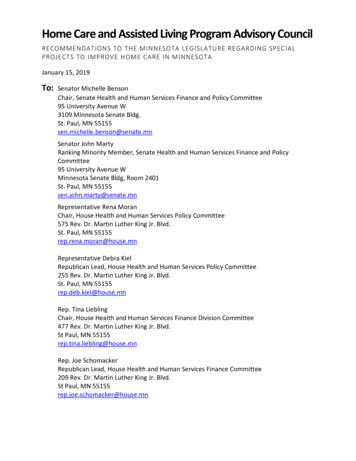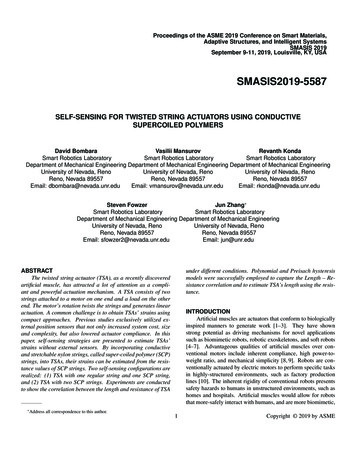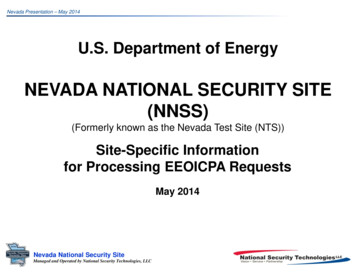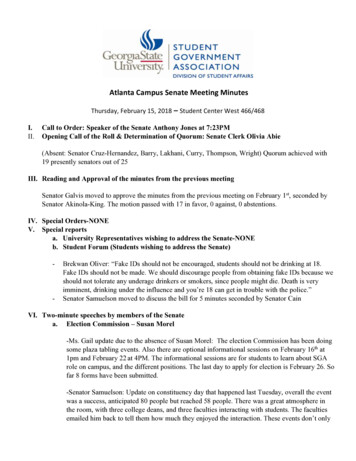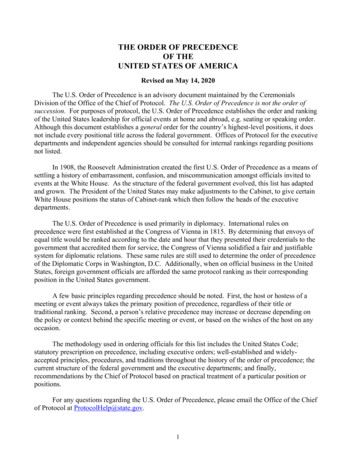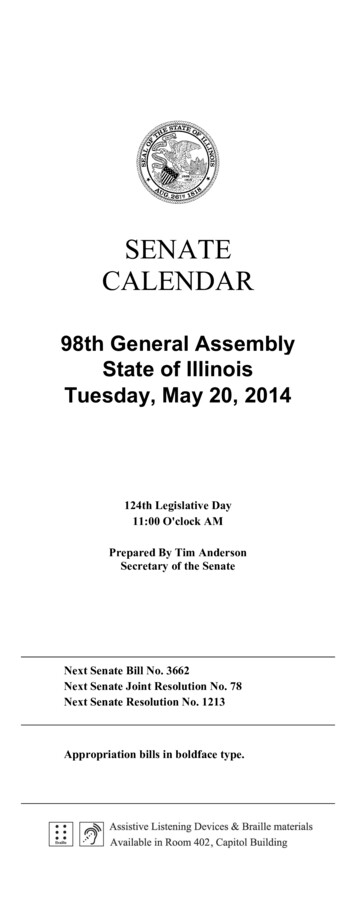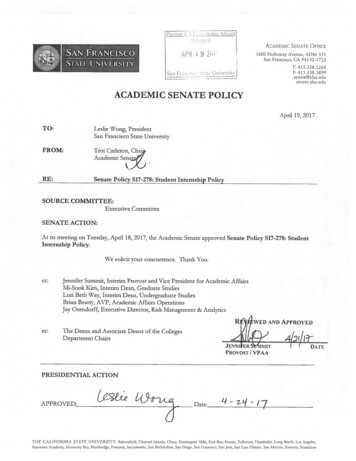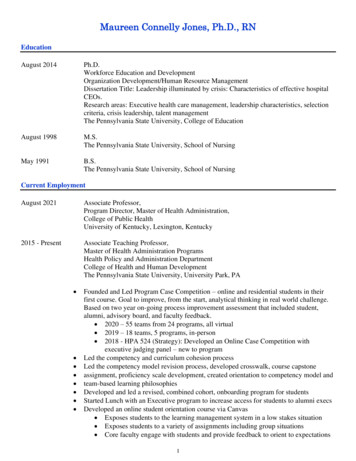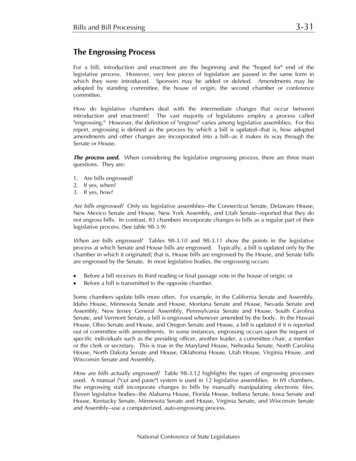
Transcription
MINUTES OF THESENATE COMMITTEE ON JUDICIARYSeventy-fifth SessionApril 3, 2009The Senate Committee on Judiciary was called to order by Chair Terry Care at8:43 a.m. on Friday, April 3, 2009, in Room 2149 of the Legislative Building,Carson City, Nevada. The meeting was videoconferenced to the Grant SawyerState Office Building, Room 4412, 555 East Washington Avenue, Las Vegas,Nevada. Exhibit A is the Agenda. Exhibit B is the Attendance Roster. All exhibitsare available and on file in the Research Library of the Legislative CounselBureau.COMMITTEE MEMBERS SenatorTerry Care, ChairValerie Wiener, Vice ChairDavid R. ParksAllison CopeningMike McGinnessMaurice E. WashingtonMark E. AmodeiSTAFF MEMBERS PRESENT:Linda J. Eissmann, Committee Policy AnalystBradley A. Wilkinson, Chief Deputy Legislative CounselJanet Sherwood, Committee SecretaryOTHERS PRESENT:Michael G. Alonso, Herbst Gaming, Inc.; Terrible Herbst, Inc.James L. Wadhams, Golden Gaming, Inc.Sean T. Higgins, Executive Vice President, GeneralGaming, Inc.; Terrible Herbst, Inc.Steve Arcana, Chief Operating Officer, Golden Gaming, Inc.Tom Clark, Nevada Tavern Owners AssociationJoe Wilcock, Nevada Tavern Owners AssociationBob Peccole, Bilbo’s Bars and GrillsRon Drake, Treasurer, Nevada Tavern Owners AssociationTerry Jicinsky, Las Vegas Convention and Visitors AuthorityCounsel,Herbst
Senate Committee on JudiciaryApril 3, 2009Page 2Jim Avance, ETT Slots; Nevada Retail Gaming AssociationLenard Loper, Owner, Rainbow Market Convenience Stores; Chukars SportsCasino & RestaurantRon Mestre, Bi-Rite MarketsMary Guinan, M.D., State Health Officer, Health Division, Department of Healthand Human ServicesJoe Pollock, Frontier and Rural Health Services Program, Health Division,Department of Health and Human ServicesMichael Hackett, American Cancer Society; Nevada State Medical AssociationRobert Eisenberg, American Cancer SocietyJoy Graber, American Cancer SocietyMary A. Anderson, M.D., M.P.H., District Health Officer, Washoe County HealthDistrictRichard P. Seher, M.D., Cardiologist, Reno Heart Physicians; President, NevadaState Medical AssociationLawrence Sands, D.O., M.P.H., Chief Health Officer, Southern Nevada HealthDistrictStephen R. Minagil, Southern Nevada Health DistrictEJ Maldonado, Tobacco Prevention Coordinator, Carson City Health and HumanServicesJosh Benke, Program Coordinator, American Lung Association of NevadaLee RadtkeLawrence P. Matheis, Executive Director, Nevada State Medical AssociationChristopher Roller, American Heart AssociationRenny Ashleman, City of HendersonKyle Davis, Policy Director, Nevada Conservation LeagueCHAIR CARE:The first item on the agenda is a work session on Senate Bill (S.B.) 221.Senator Washington is not present so we will remove S.B. 221 from theagenda.SENATE BILL 221: Establishes a program of parole secured by a surety bond.(BDR 16-926)Let us open the hearing on S.B. 354. Where did Mr. Ashleman go?SENATE BILL 354:(BDR 22-235)Revisesprovisionsgoverninglandusedecisions.
Senate Committee on JudiciaryApril 3, 2009Page 3CHAIR CARE:I am not going to delay this any further. We will hear the testimony on S.B. 372and then follow with testimony on S.B. 354.SENATE BILL 372: Revises the Nevada Clean Indoor Air Act. (BDR 15-1099)CHAIR CARE:Senate Bill 372 revises the Nevada Clean Indoor Air Act. I would like theproponents of the bill to come forward. We do not have floor today, so we willgo to 11:30 a.m., but it will not be possible to allow everybody to testify.MICHAEL G. ALONSO (Herbst Gaming, Inc.; Terrible Herbst, Inc.):Before I go through the provisions of the bill, I want to provide some context onthe Clean Indoor Air Act and what S.B. 372 proposes to do. The proponents ofthe Clean Indoor Air Act made the intent of protecting children from secondhandsmoke clear while they gathered signatures and campaigned to get the initiativepassed. The Clean Indoor Air Act initiative petition provides, and I quote, “ThisAct shall be known, cited and referred to as the Clean Indoor Air Act, theNevada Clean Indoor Air Act protecting children and families from secondhandsmoke.” Contrary to what the opponents of this bill will tell you, S.B. 372continues to protect children. The Clean Indoor Air Act was poorly written andis ambiguous. The problems with the Act have made enforcement difficult bythe local governments and the State. James Wadhams will speak to theenforcement issues in more detail.I would like to walk the Committee through the bill.CHAIR CARE:We have received e-mails from proponents and opponents, and thecharacterizations of what the bill does has been read in many different ways.Please provide us with your interpretation.MR. ALONSO:Section 1, subsection 3, paragraph (b) adds a new definition of adultstand-alone bar, tavern and saloon. Under paragraph (f), we modified thelanguage of the Act. Subsection 1 reads, “Except as otherwise provided insubsection 3 .” That is where you can smoke as an exception to the Act.The bill provides for a public smoking area in an indoor place of employment if itis a completely enclosed area. The smoking area must contain a separate
Senate Committee on JudiciaryApril 3, 2009Page 4method of ventilation from the other public areas of the indoor place ofemployment which substantially prevents smoke from infiltrating the otherpublic areas. Persons under 21 years of age are prohibited at all times fromentering into that area. In a grocery store, the gaming devices would becompletely enclosed, there would be a separate ventilation system and nobodyunder the age of 21 could walk into that room. This is one example of what weare talking about. You have to look at all those parts; all of those things have tobe there.Section 1, subsection 3, paragraph (g), subparagraphs (1), (2) and (3) state, andI quote: the areas of convention facilities in which a meeting or tradeshow is being held, during the time the meeting or trade show isoccurring, if the meeting or trade show: is not open to the public;in other words, it is a private show, is being produced or organizedby a business relating to tobacco or a professional association of,for convenience stores; and involves the display of tobaccoproducts.We are talking about a limited exception. Terry Jicinsky is in Las Vegas and willprovide testimony with respect to the economic impact the Act has had ontrade shows in Las Vegas.We deleted subsection 5, giving the control on smoking back to the State. Therest of the sections provide the State Health Officer with the enforcementpowers.The definition of adult stand-alone bar, tavern or saloon is implemented insubsection 8. The establishment must be licensed to sell alcoholic beverages,must hold a nonrestricted license or restricted gaming license and prohibitpersons under 21 years of age from entering the premises at all times. Adultscan smoke, and no children are allowed. We are protecting children, makingenforcement easier, giving adults a choice and giving the owner the choice ofmaking his or her business an over-21 establishment.The rest of the bill is cleanup. The effective date of December 9 is set forth insection 2, three years after the Clean Indoor Air Act went into effect.
Senate Committee on JudiciaryApril 3, 2009Page 5JAMES L. WADHAMS (Golden Gaming, Inc.):It is important for the Committee members to understand what S.B. 372proposes to do to the initiative petition. Parenthetically, sometimes initiativepetitions that do not go through the vetting process of our legislative activityend up with ambiguities and contradictions. In southern Nevada,Douglas W. Herndon, District Judge, Department 3, Eighth Judicial District,reviewed the petition and said it was unconstitutional on its face as a criminalstatute because of its inherent ambiguities. It is important to recognize it is nota smoking ban. The Act is designed to protect children and families fromsecondhand smoke in most public areas, excluding stand-alone bars and gamingareas of casinos. The Act is designed to say where smokers can and cannotsmoke. It does not ban smoking; it deals with those locations permitted and notpermitted for smoking.Senate Bill 372 preserves and enhances the protection of children in section 1,subsection 3, paragraph (f), subparagraph (3) which reads, “Persons who areunder 21 years of age are prohibited at all times from being present in thesmoking area; ” They are isolated from secondhand smoke because they areprohibited from the area. A similar phrase appears in section 1, subsection 8,paragraph (a), subparagraph (3) which reads, “Prohibits at all times persons whoare under 21 years of age from entering the premises.” That was not in the Act.This prohibits those people going into smoking areas, adult-only locations,where people can make their own choices about smoking, gambling, eating anddrinking. Family restaurants are still under the smoking ban.Section 1, subsection 8, paragraph (m), subparagraph (1) suggests the draftersof this Act anticipated that completely enclosed areas in such places asrestaurants, public places, indoor workplaces or strip malls would be permittedplaces for smoking. The language that Mr. Alonso identified in section 1,subsection 1, paragraph (f) is not a radical change. It recognizes that completelyenclosed areas are places where smoking can occur. Some may argue that wehave not added sufficient protection, but in the proposal that Mr. Alonsoidentified, it is required there be a separate method of ventilation. The draftersof the original Act said infiltration must be avoided. We have suggested it becompletely separate. This enclosed area is not a radical, new concept. It wasembodied in the original Act as passed by the people.I have heard concerns about the preemption of local health authorities. This isnot an accurate representation. I have been working with the Southern Nevada
Senate Committee on JudiciaryApril 3, 2009Page 6Health District, which has been seeking direction from the State Health Officerand the Nevada State Health Division, to make statewide regulations. It is inthat effort we thought it appropriate to add the language so that the StateHealth Officer or designee, which would be delegated to the Washoe CountyHealth District and the Southern Nevada Health District, can create statewideregulations to allow some uniformity in this process.The other area I want to identify is an important notion. My client will be uphere to talk about his operation, comprised largely of smoking bars which arelegal smoking locations under this Act. Does this mean he will have moresmoking locations? I think not. It means those locations now legally qualified tobe smoking establishments will be restricted to people over the age of 21, andthey can serve a hamburger to the patrons. It adds a category making it clearthat the establishment is an adult-only location. Once an adult chooses to enter,he or she is not precluded from ordering food in that location. In my discussionswith the Southern Nevada Health District, it became clear that eating was notprohibited in a stand-alone bar; it was the service of food by the stand-alonebar. Eating and smoking were not the issue. I am not sure if that was the intentof the drafters, but this creation of an adult stand-alone bar makes it clear thatthose adults who choose to enter those locations will be able to eat.What are the significant changes? Senate Bill 372 clarifies the exception in theenacting clause of the Act allowing stand-alone taverns that have gaminglicenses to allow smoking as long as persons under the age of 21 are prohibited.People who choose to smoke and gamble can eat if they would like. It alsoallows for the construction of completely enclosed areas. I have identified thatas already embedded in the Act, allowing smokers to smoke in a safeenvironment without endangering those who do not want to be exposed tosecondhand smoke and prohibiting those persons under the age of 21 fromentering the smoking area.The significant change is the allowance of tobacco-related conventions.Reenergizing our tourism and convention activity is a critical componentthroughout the State. Under the Clean Indoor Air Act, those sorts of eventscannot be allowed.We are proposing S.B. 372 for many reasons. The first reason is choice. We areNevadans, we are Americans and we should be able to exercise our choices.Secondly, local businesses suffered significant and dramatic job and revenue
Senate Committee on JudiciaryApril 3, 2009Page 7loss from the enactment of the Clean Indoor Air Act. Thirdly, we think S.B. 372will enhance business and tourism. Lastly, it will lend clarity to this clouded lawin statewide uniformity of enforcement.Once the Committee reads the Act and the amendments in the context of whatthey do, you will see that S.B. 372 does not repeal or dismantle the CleanIndoor Air Act. It refocuses the Act and leaves the basic principle of the CleanIndoor Air Act intact. There are places where you can smoke, and there areplaces where you cannot smoke. Most importantly, we are protecting thosewho choose to go where smoking is not permitted from secondhand smoke.CHAIR CARE:We have seen the implementation of the 2006 Clean Indoor Air Act. This wouldallow a stand-alone bar, tavern or saloon to convert if it wished to an adultstand-alone bar, tavern or saloon. Let me hone in on section 1, subsection 3,paragraph (f) where we talk about indoor places of employment. A grocery storeis a place of employment; a movie theater is a place of employment. Howbroadly should this language of indoor place of employment read? Wouldgrocery store employees be allowed to take a smoke break within a closed-offarea in the grocery store?MR. ALONSO:If the workers within that enclosed area were over 21 years of age, they wouldbe able to take a smoke break under the reading of this bill.CHAIR CARE:Okay. Paragraphs (a) through (g) of subsection 1, section 1 would be indoorplaces of employment. Would the language in paragraph (f), subsection 3 ofsection 1 permit a smoking place in an enclosed area in each one of thoseplaces of employment?MR. ALONSO:The answer to that question is yes. The language follows the way the Act waswritten, with the exceptions in subsection 3. We focused on certain types ofbusinesses. We tried to make the language workable, so we used the languagein the Act. Subsection 2 of section 1 states, “Without exception, smokingtobacco in any form is prohibited within school buildings and on schoolproperty.” If it is the pleasure of the Committee to change that and include childcare facilities or areas where you do not think smoking should be, even if you
Senate Committee on JudiciaryApril 3, 2009Page 8put in the smoking capsule, subsection 2 would be the place to drop it. We triedto make it clear that smoking would be allowed if you have a ventilated smokingarea and prohibit people under the age of 21. This is a policy decision for theCommittee. I do not think any child care facility in this State would put in asmoking capsule.CHAIR CARE:What parent would want to send their child to that facility if they did?MR. ALONSO:Right. You are reading it correctly.CHAIR CARE:In section 1, subsection 3, paragraph (f), subparagraph (2), there is a line thatreads, “ substantially prevents smoke from infiltrating the other public areas .” You may want to have other people testify on this issue. It does not sayprevent smoke, it says substantially prevent smoke. It sounds like a smalldifference, but I am sure this will be an issue you may want to address.MR. ALONSO:There are people who may answer this more clearly than I can. Prior to the Act,there was language in effect in the State law on smoking. You cannot prevent100 percent of the smoke from coming out of the smoking area. The wordsubstantially is used to allow compliance with the law.SENATOR AMODEI:Mr. Wadhams, you mentioned there has been a court case in Clark County onthe criminal penalties.MR. WADHAMS:Yes, Senator Amodei, there was a case.SENATOR AMODEI:Who brought that case? Can you describe the circumstances and the outcome?I presume the Clark County District Attorney was the prosecutor?MR. WADHAMS:It was a challenge to the statute brought by several entities including the Herbstgroup, the Golden group and the Nevada Tavern Owners Association. The case
Senate Committee on JudiciaryApril 3, 2009Page 9argued the law was unconstitutional. There were two bases of that challenge: itis unconstitutional on its face, and it is unconstitutional as applied. The judgeruled on the level of the standard applied for criminal enforcement, ruling it wasunconstitutional on its face because of the ambiguities. It was an impressivediscussion and heavily briefed. He did not rule it unconstitutional on its face as acivil enforcement statute, just as a criminal statute. He did indicate thatdepending on how the regulations were developed, it could be unconstitutionalas applied.We have not had regulations developed, and as I referenced in one of my earliercomments, the Southern Nevada Health District had solicited the State to havebroader regulations. Senator Amodei, the simple answer to your question isDistrict Judge Herndon ruled it unconstitutional on its face as a criminal statutebut left open the opportunity in the interpretation as a civil enforcement statute.SENATOR AMODEI:I assume somebody was issued a misdemeanor citation, and that was the basisfor the case going up, or was it a request for declaratory relief?MR. WADHAMS:It was for declaratory relief.SENATOR AMODEI:You said your clients appeared, saying the Act was unconstitutional. Whoappeared on the other side?MR. WADHAMS:The Southern Nevada Health District.SENATOR AMODEI:How long ago was the case? Has it been appealed or has the appeal periodexpired for that ruling?MR. WADHAMS:There may be others who can correct me. I do not recall, but that case wasdecided in late 2006.SENATOR AMODEI:No appeal was taken by the Health District as to the ruling on the criminal?
Senate Committee on JudiciaryApril 3, 2009Page 10MR. WADHAMS:That case was appealed and is pending in the Nevada Supreme Court. The oralargument is next Monday.SENATOR AMODEI:Mr. Chair, would it be possible to ask Bradley Wilkinson to get us the briefs forthe comparative sides on that issue before the Supreme Court?CHAIR CARE:Sure, if you would, please.SENATOR ingDistrict Judge Herndon’s decision on the constitutionality of the criminalprovisions? Is there any proposed fix in your legislation regarding that judicialaction?MR. ALONSO:We have not. It is primarily a drafting issue. I direct the Committee to section 1,subsection 6, which reads, “ this section pursuant to Nevada Revised Statue(NRS) 202.2492 and NRS 202.24925.” The reference to NRS 202.2492 is thecriminal piece. Senator Amodei, the fix would be to remove that statutoryreference and the word “and.”SENATOR WASHINGTON:Subsection 6 states the State Health Officer shall be the one to designate theregulatory process for the entire State. Is this the section that will add clarity tothat court case in regard to the criminal provisions that may be contested asunconstitutional?MR. WADHAMS:It was our anticipation that the designee in the urban areas would beWashoe County Health District and the Southern Nevada Health District. Inother counties that do not have health officers, the State would haveopportunity and clear authority to adopt statewide regulations. That wasintent of that change.thethethethe
Senate Committee on JudiciaryApril 3, 2009Page 11SENATOR WASHINGTON:Under Clark County and Washoe County, you indicated the regulations to beadopted are ambiguous. Has there been any uniformity in those regulations inregard to the smoking ban?MR. WADHAMS:No regulations have been adopted. There have been several drafts proposed,but nothing has been adopted by the board of the Southern Nevada HealthDistrict. I do not believe anything has been adopted by Washoe County. We donot have a statewide standard.SENATOR WASHINGTON:If I am reading you correctly, it is vague as we speak.MR. WADHAMS:Yes, Senator Washington.MR. ALONSO:Senator Washington, the Clean Indoor Air Act makes a difference between anonrestricted license and a restricted license. Many places throughout the Statethat do not have hotel rooms were issued nonrestricted gaming licenses prior tothe passage of the Resort Hotel Act in 1991. There are grocery stores and barsthat have nonrestricted gaming licenses. Under the Act, some grocery storeshaving those nonrestricted gaming licenses allow smoking. In Washoe County,there is a chain of grocery stores with three stores that have nonrestrictedgaming licenses, and smoking is allowed. They made a deal with the DistrictAttorney that as long as they enclose that area, people could smoke. InClark County, grocery stores with nonrestricted gaming licenses were told theycannot allow smoking and that the Health Division would go after them becausethey were a grocery store. This is my understanding, and there are people whocan provide clarification. This addresses your question about the interpretationand how the Act was written.SENATOR WASHINGTON:I remember those provisions several sessions back in regard to retailestablishments. In particular, grocery store outlets were required to provideadequate ventilation in encapsulated areas for smoking. I understand where theprovisions are and what you are talking about. My concern is having the State
Senate Committee on JudiciaryApril 3, 2009Page 12Health Officer develop uniform or statewide regulations to enforce the nosmoking rule so there is continuity and consistency across the board.MR. WADHAMS:Because of the way the Clean Indoor Air Act is written, some stand-alone bars,smoking locations that have stopped serving food out of their kitchens and laidoff those employees, may have prepackaged food appear in plastic containers.People can walk across the street, buy food at Wendy’s and bring it back to thestand-alone bar. The ambiguity is there is no prohibition on eating food in asmoking stand-alone bar. It prohibits the stand-alone bar from serving food to itscustomers. That ambiguity has created confusion throughout the State as towhat is and what is not allowed. The preamble of the Act was not intended tocover stand-alone bars. It has become a nightmare to figure who is in, who isout. If we declare adults-only, then let the adults make the choice. Let usprotect the kids and move on.SENATOR WIENER:As a follow-up to the regulatory question, because the Health Division hasjurisdiction over the remaining counties, have they adopted the regulations? Wecannot enforce without regulations. What has the enforcement history beenwith the other counties?MR. WADHAMS:About one year ago, the State Board of Health held a hearing to begindiscussing those regulations. None have been produced yet. We have had noworkshops on regulations. That effort has stalled. There may have beenambiguity as to whether the authority was there to adopt the regulations.Whatever the administrative problem, it has not developed at the State level.We think this Act would clarify that authority.SEANT. HIGGINS (Executive Vice President, General Counsel, HerbstGaming, Inc.; Terrible Herbst, Inc.):Senate Bill 372 is an important step in clarifying the smoking laws in the Stateof Nevada as well as helping the State’s economic recovery. It provides aclarification of the Clean Indoor Air Act passed by voter initiative inNovember 2006. Senate Bill 372 is not at odds with this piece of initiative; itstrives to accomplish the stated goal of the Act to protect children and familiesfrom the effect of secondhand smoke. Senate Bill 372 does not expand thepossibility of smoking to any area which would allow entry by children, anyone
Senate Committee on JudiciaryApril 3, 2009Page 13under the age of 21, except as allowed under the Clean Indoor Air Act.Senate Bill 372 does take into consideration the free choice that adults can anddo make on a regular basis with regard to smoking and other issues. The billwould allow smoking in completely enclosed, separately ventilated areas whichare restricted to persons over the age of 21.During the initiative process in 2006, many companies, mine included, madeassertions that if this initiative was passed as written, there would be direeconomic consequences to our businesses and the State of Nevada. We wererebuffed at every turn and told that by turning into a nonsmoking establishment,we would see new business from nonsmoking customers. I would like to reviewwhat happened to our company following the enactment of this initiative.Herbst Gaming, Inc., is a public reporting company. Our documents are availableon the Securities and Exchange Commission Website for verification. FromJanuary 2007 through June 30, 2007, immediately following the passage of theNevada Clean Indoor Air Act, Herbst Gaming, Inc., suffered economic setbacks.We lost 18 percent of our revenues from our slot route operation and62 percent of our earnings before interest, taxes, depreciation and amortization.That number totaled over 50 million from our bottom line. The passage of theClean Indoor Air Act was the cause for these losses. We have suffered, as havemany other companies, additional economic setbacks distinguishable in timefrom the smoking ban. In the last year, we have suffered setbacks more to ourcasino businesses, much like the other casinos in the State have suffered.Following the enactment of the Clean Indoor Air Act, Herbst Gaming had theability to renegotiate our contractual rental payments with many of our grocerystores, drug stores and convenience store chains. Following our renegotiation ofthose leases and since then, we have had 15 grocery stores close specificallybecause their rental payment was reduced, making their stores unviableeconomically. Several other grocery stores have ceased 24-hour operations inan attempt to reduce costs and recover lost money by the lowered rent.The entire chain of Rite Aid Drugstores closed following this enactment becausewe reduced their rental payment as allowed under our rent. On average, agrocery store in Nevada employs 65 people. Approximately 1,000 jobs werelost in those 15 locations. On average, a Rite Aid Drugstore employed20 people; another 680 jobs were lost.
Senate Committee on JudiciaryApril 3, 2009Page 14MR. HIGGINS:We operate at several hundred tavern locations in the State. Over 75 percent ofthose taverns saw a dramatic drop in their gaming revenue in the six monthsimmediately following the enactment of the Clean Indoor Air Act. Over 30 ofthose locations have closed because of the smoking ban. The number of closedlocations is 11 percent of our route. This accounts for over 1,000 gamingdevices on the street, which is in excess of 14 percent of our total route.The loss of revenue for Herbst Gaming, Inc., dropped almost directly to ourbottom line. We must provide service to locations regardless of their revenue.We send teams to collect the money, we have mechanics to repair the gamesand we must have change personnel available at all times games are offered forplay to the public. Our labor costs do not drop commensurate with any drop inrevenue.Passing S.B. 372 will give businesses who cater to persons 21 years and olderthe choice of whether they want to make their establishment compliant with therequirements set forth in this bill. It is not an automatic. Each business will haveto decide if the investment necessary to comply with S.B. 372 makes economicsense. Each of these business owners will have to gauge their respectiveclientele to decide whether a smoking establishment is appropriate.Senate Bill 372 takes into account the health and well-being of the children ofthe State of Nevada. It does not expand any areas where children can go wheresmoking would be allowed. It takes into account the economic well-being ofbusinesses in the State. It takes into account the employees who are citizens ofNevada and take pride in the opportunity to work and gain benefits these jobsoffer. It takes into account the overall health of Nevada’s economy andattempts to find ways to pull the State out of this recession.This body is tasked with weighing all of these issues when making these typesof decisions. This is not a task shared by the initiative process, where peoplecan manipulate the question to suit their needs without vetting all the issues. Itis in the best interest of the State of Nevada and its citizens to pass thislegislation. It will continue to protect our children; it will provide jobs for ourcitizens; it will allow choices for people over the age of 21 and choices forbusiness operators. It is an emotional issue for many people, but smoking is stilllegal in the United States. We are not eradicating smoking; we are limitingsmoking to locations frequented by people 21 and over.
Senate Committee on JudiciaryApril 3, 2009Page 15STEVE ARCANA (Chief Operating Officer, Golden Gaming, Inc.):Golden Gaming is a diversified gaming company operating casinos in Nevadaand Colorado. We participate in route accounts throughout the State, and weare the largest tavern operator in Nevada with over 45 locations. SouthernNevada holdings include our flagship Sierra Gold brand and PT’s Gold, PT’s Pubsand PT’s Places. Golden Tavern Group also operates in northern Nevada,including brands of Sierra Gold, Sierra Junction, Sparky’s Sports Bar and theGold Bar in Fernley.Since the acquisition of PT’s Gaming LLC in May 2002, the company has growninto the Golden Tavern Group through a series of acquisitions as well as severalground-up developments. Our Sierra Gold brand is casually upscale and featuresrefined décor and a comfortable atmosphere. Our PT’s Gold brand hasestablished itself as Las Vegas’s tavern of choice, featuring a casual, upscaleatmospher
Senator David R. Parks . Senator Allison Copening . Senator Mike McGinness . . Joe Wilcock, Nevada Tavern Owners Association . Bilbo's Bars and Grills Ron Drake, Treasurer, Nevada Tavern Owners Association Terry Jicinsky, Las Vegas Convention and Visitors Authority . Senate Committee on Judiciary
